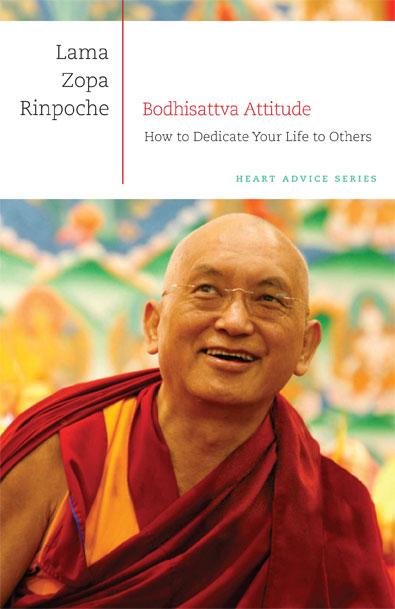Bodhisattva Attitude brings together several motivations taught by Lama Zopa Rinpoche to be used first thing each morning to generate a bodhicitta motivation and, on the basis of that, train the mind in the bodhisattva attitude.
The motivations were first taught by Lama Zopa Rinpoche during the opening days of a series of experiential lamrim retreats called Light of the Path,1 highlighting at the very outset of the teachings the importance of motivation in our daily lives and activities. Several of the motivations were subsequently re-taught at various locations around the world and then collected together here.
This series presents chapters from Bodhisattva Attitude in a multimedia format that weaves together all the assets found in the Archive: transcripts enhanced as much as possible by video, audio and images, and supplemented by other related material.
Click on the chapter links below to experience the teachings, or go to multimedia.lamayeshe.com to find the free collection of all LYWA multimedia titles.
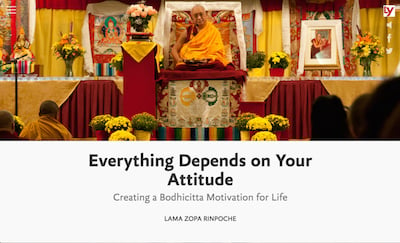 Everything Depends on Your Attitude. In this introductory talk at the first Light of the Path retreat in 2009, Lama Zopa Rinpoche explains why everything—good and bad—depends on our mental attitude and why having a good heart wishing to benefit all living beings is so essential. The teaching is interwoven with stories from Rinpoche’s own early life.
Everything Depends on Your Attitude. In this introductory talk at the first Light of the Path retreat in 2009, Lama Zopa Rinpoche explains why everything—good and bad—depends on our mental attitude and why having a good heart wishing to benefit all living beings is so essential. The teaching is interwoven with stories from Rinpoche’s own early life.
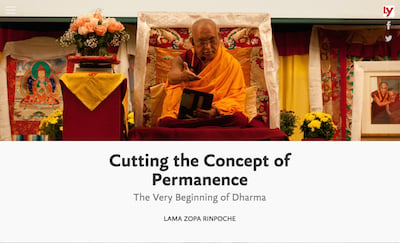 Cutting the Concept of Permanence. Lama Zopa Rinpoche focuses from every angle on our habitual mistaken belief that we are going to live for a long time. Abandoning this belief is the very beginning of Dharma and is essential for maintaining continual intensive Dharma practice. Rinpoche then specifically instructs on how to practice tonglen with loving-kindness and compassion.
Cutting the Concept of Permanence. Lama Zopa Rinpoche focuses from every angle on our habitual mistaken belief that we are going to live for a long time. Abandoning this belief is the very beginning of Dharma and is essential for maintaining continual intensive Dharma practice. Rinpoche then specifically instructs on how to practice tonglen with loving-kindness and compassion.
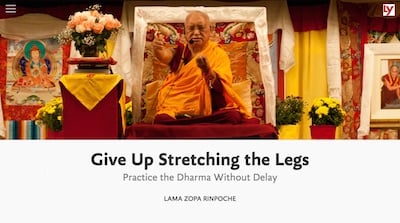 Give Up Stretching the Legs. An extensive commentary on the three-fold advice in the verse sung by the dakas and dakinis to awaken the tantric yogi or yogini from sleep. The verses inspire everyone to give up clinging to this life, all samsaric pleasures and the self-cherishing thought, and instead to practice tantra motivated by the extraordinary mind of bodhicitta.
Give Up Stretching the Legs. An extensive commentary on the three-fold advice in the verse sung by the dakas and dakinis to awaken the tantric yogi or yogini from sleep. The verses inspire everyone to give up clinging to this life, all samsaric pleasures and the self-cherishing thought, and instead to practice tantra motivated by the extraordinary mind of bodhicitta.
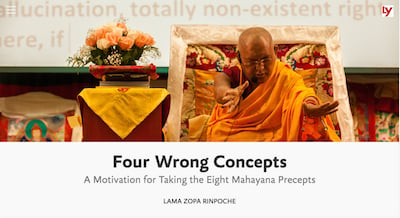 Four Wrong Concepts. Lama Zopa Rinpoche looks clearly at our motivation for taking the eight Mahayana precepts and helps us see the four mistaken ways of viewing ourselves and the world. These four wrong concepts have kept us trapped and suffering in cyclic existence from beginningless time. The main wrong concept is ignorance—the self-grasping of the person and of the aggregates—which is the originator of the others.
Four Wrong Concepts. Lama Zopa Rinpoche looks clearly at our motivation for taking the eight Mahayana precepts and helps us see the four mistaken ways of viewing ourselves and the world. These four wrong concepts have kept us trapped and suffering in cyclic existence from beginningless time. The main wrong concept is ignorance—the self-grasping of the person and of the aggregates—which is the originator of the others.
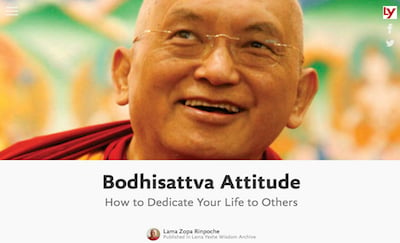 Bodhisattva Attitude. This set of verses is to be used each morning as a daily practice to strengthen our bodhicitta motivation in order to achieve the enlightened state as quickly as possible for the benefit of all sentient beings. Rinpoche’s extensive commentary on these verses contains a wealth of precious and inspiring advice on how to dedicate our life to others by constantly cultivating the bodhisattva’s attitude.
Bodhisattva Attitude. This set of verses is to be used each morning as a daily practice to strengthen our bodhicitta motivation in order to achieve the enlightened state as quickly as possible for the benefit of all sentient beings. Rinpoche’s extensive commentary on these verses contains a wealth of precious and inspiring advice on how to dedicate our life to others by constantly cultivating the bodhisattva’s attitude.
These titles are edited by Ven. Sarah Thresher and Megan Evart, with technical assistance from lamrim.com's Roy Harvey. We are also very grateful to our friends at FPMT for generously sharing their Light of the Path resources. We hope your understanding of these precious teachings is deepened by engaging the Dharma in this multidimensional way.
NOTES
1 Light of the Path is a series of annual retreats led by Lama Zopa Rinpoche and hosted by FPMT's Kadampa Center, USA. Visit FPMT's Light of the Path Teachings Archive for audio and video recordings in English and other languages, as well as links to resources associated with the retreats. Read more about Light of the Path 2017 here. [Return to text]
























